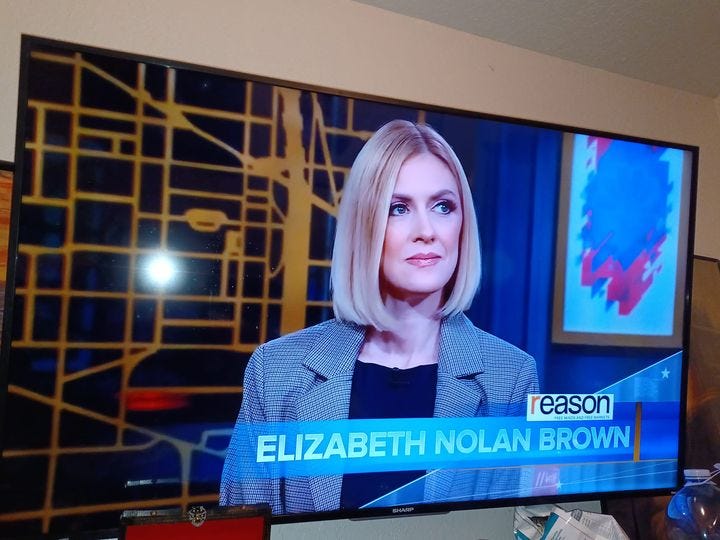In Defense of Algorithms
... and "screen time," too, while we're at it.
In Reason’s January 2023 cover story, I attempt to pour a little cold water on some of the very heated rhetoric around algorithms. The piece looks at how the shift from chronological social media feeds to algorithmic ones coincided with some wild times in U.S. politics and suggests that this might explain why they’ve become a catchall culprit in theories about political dysfunction and social ills. These days,
the list of social ills blamed on algorithms is a long one. Echo chambers. Political polarization. Misinformation. Mental health problems. The election of Donald Trump. Addiction. Extremism. Teen suicides. The election of Joe Biden.
Headlines are full of warnings about algorithms. They "are controlling your life" (Vox), "amplifying misinformation and driving a wedge between people" (The Hill), fueling "massive foreign propaganda campaigns" (The Conversation), and serving as a "radicalization machine for the far-right" (The Daily Beast), to list a few.
Congress has been fretting too. Tech companies use "algorithms to drive destructive content to children," according to Sen. Richard Blumenthal (D–Conn.). Sen. Josh Hawley (R–Mo.) claims that Google algorithms dictate the outcomes of elections, while Sen. Elizabeth Warren (D–Mass.) says Amazon algorithms are "feeding misinformation loops." And Facebook algorithms "undermine our shared sense of objective reality" and "intensify fringe political beliefs," according to Reps. Anna Eshoo (D–Calif.) and Tom Malinowski (D–N.J.)
Algorithms, especially those used by search engines and social media, have become a strange new front in the culture war. And at the heart of that battle is the idea of control. Algorithms, critics warn, influence individual behavior and reshape political reality, acting as a mysterious digital spell cast by Big Tech over a populace that would otherwise be saner, smarter, less polarized, less hateful, less radical. Algorithms, in this telling, transform ordinary people into terrible citizens.
The truth — according to a whole host of research, which I lay out in this piece — is that algorithms are nowhere near as powerful or destructive as critics would have us believe:
Despite the dire warnings found in headlines and congressional pronouncements, a wealth of research and data contradicts the idea that algorithms are destroying individual minds and America's social fabric. At worst, they help reveal existing divides, amplify arguments some would prefer to stay hidden, and make it harder for individuals to fully control what they see online. At best, they help make us better informed, better engaged, and actually less likely to encounter extremist content. Algorithms aren't destroying democracy. They just might be holding it together.
Algorithms also just make the average person’s online experience so, so, so much better. They make our search engine results more relevant and save us time on social media by surfacing posts from people we care most about. They help introduce us to music, movies, books, podcasts, and products we might not otherwise discover, or would at least have to spend a lot more time seeking out in a non-algorithm driven world.
Earlier this month, I got to defend algorithms and talk about other Big Tech issues on Meet the Press. If you watch the whole program — which featured the likes of “Facebook whistleblower” Frances Haugen and Sen. Amy Never-Met-a-Tech-Panic-She-Didn’t-Love Klobuchar — you’ll encounter a lot of the ideas that I’ve tried to counter in the algorithms feature and my previous work (like “The Bipartisan Antitrust Crusade Against Big Tech” and “Section 230 Is the Internet's First Amendment. Now Both Republicans and Democrats Want To Take It Away”). But the other guests on the roundtable segment I took part in were much more measured, and refreshingly realistic about what government can and can’t do in this realm.

Overall, it was a great experience—Chuck Todd was super funny and down-to-earth when he chatted with us before and after taping, and all of the producers were so nice—and I’m grateful to MSNBC for giving me the opportunity to talk about these issues in front of a national audience. (Also, shout out to the woman who did my hair and makeup and managed to make me look way more sleek than I thought possible.)

I also talked about algorithms recently with Corbin Barthold of TechFreedom, though we spent the bulk of our podcast conversation talking about kids and the dreaded screen time. Specifically, we discussed five recent studies that challenge conventional wisdom about kids and tech, from cell phones to social media to video games and TV.
You can catch the whole podcast here.



One last note on tech: I, like seemingly everyone else late last year, joined Mastodon. It’s a gentler, quieter space than Twitter, much less conducive to drama and virility and more conducive to actual smart and productive conversations — so, you know, kind of a mixed blessing, to be honest. If you’re into that sort of thing, you can find me at journa.host/@enbrown. And if you’re still not sure what Mastodon is or how to use it, here’s a guide I published at Reason back in November.
